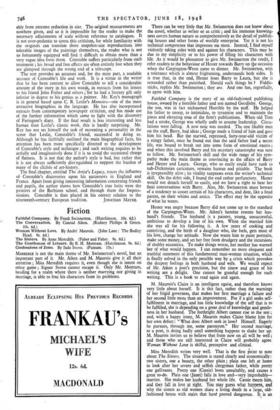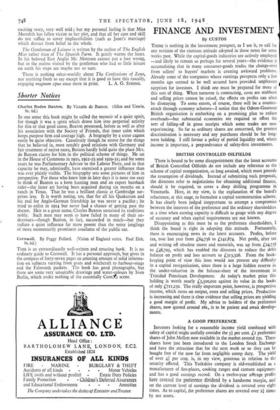Fiction
The Sisters. By Anne Meredith. (Faber and Faber. 9s. 6d.)
MARRIAGE is not the main theme of Mr. Swinnerton's novel, but an important part of it. Mr. Aiken and M. Maurois give it all their attention ; Miss Meredith requires it, even though she is intent on other game ; Signor Svevo cannot escape it. Only Mr. Mottram, heading for a realm where there is neither marrying nor giving in marriage, is able to free his characters from its problems. There can be very little that Mr. Swinnerton does not know about the novel, whether as writer or as critic ; and his immense knowing- ness covers human nature as comprehensively as the detail of publish- ing houses and other forms of worldly enterprise. Yet it is not his technical competence that impresses me most. Instead, I find myself violently taking sides with and against his characters. This may be due to my simplicity or to his power of filling his characters with life. As it would be pleasanter to give Mr. Swinnerton the credit, I refer readers to the behaviour of Hester towards Barry on the occasion when the Carpington-Wests came to dinner. Mr. Swinnerton, with a tolerance which is almost frightening, understands both sides. It is true that, in the end, Hester loses Barry to Laura, but she is rewarded rather than punished. Should such things be ? Fiddle- sticks, replies Mr. Swinnerton ; they are. And one has, regretfully, to agree with him.
Faithful Company is the story of an old-fashioned publishing house, owned by a horrible father and son named Goodleby. George, the son, was in fact nicknamed Horrible by the staff. He helped his father to snoop, to intimidate, to tyrannise and to maintain the pious and elevating tone of the firm's publications. When old Tom had a stroke, George was wholly unfit to assume leadership. Circu- lations were falling. A new note was needed. The one likable man on the staff, Barry, had ideas ; George made a friend of him and gave him his head. But the starved, repressed, forty-year-old victim of a stingy father, once he found out that the said father had a secret life, was bound to break out into some form of emotional excess ; and when this involved Barry and his secretary catastrophe was sure to follow. Mr. Swinnerton's skill and the wide range of his sym- pathy make the main theme as convincing as the affairs of Barry and Hester and Laura. George, who so easily could have sunk to sub-Dickensian caricature, remains human and pitiable. The book is irrepressibly alive ; its vitality surpasses even the writer's technical skill. On the debit side, I found the end rather perfunctory. Hester would not detach herself so easily, and we have a right -to hear her final conversations with Barry. Also, Mr. Swinnerton must beware of a tendency to cosset certain of his characters, and dote, like a fond parent, on their whims and antics. The effect may be the- opposite of what he wants.
Hester was angry because Barry did not come up to the standard of the Carpington-Wests. Mr. Aiken's heroine resents her hus- band's friends. The husband is a painter, young, unsuccessful, ambitious to develop a line of his own. When she married him she was all for his following it. A few years of cooking and contriving, and the birth of a daughter who, she feels, gets most of his loire, change her attitude. Now she wants him to paint portraits, make some money, and set her free from drudgery and the incursions of shabby eccentrics. To make things worse, her mother has warned her of what would happen. I can remember no more eloquent and truthful statement of this fundamental man-woman situation, which is finally solved in the only possible way by a crisis which provokes the deepest feelings in both husband and wife. We would expect of Mr. Aiken a poet's precision, but the sinew and grace of his writing are a delight. One cannot be grateful enough for such writing. This is a book to read again and again.
M. Maurois's Claire is an intelligent egoist, and therefore knows very little about herself. It is this fact, rather than the warnings of her frigid governess, that makes her first marriage a failure and her second little more than an improvement. For if a girl seeks self- fulfilment in marriage, and has little knowledge of the self that is to be fulfilled, she is depending on a great deal of knowledge and gentle- ness in her husband. The forthright Albert cannot rise to the test ; and, with a happy irony, M. Maurois makes Claire blame him for her own defect : " What does Albert seek in love? Himself. Eagerly he pursues, through me, some paroxysm." Her second marriage, to a poet, is doing badly until something happens to shake her up. M. Maurois invites us to believe that from now on all will be well ; and those who are still interested in Claire will probably agree. Woman Without Love is skilful, perceptive and clinical.
Miss Meredith writes very well. That is the first 'tint to note about The Sisters. The situation is stated clearly and economically: two sisters, one a beauty, the other plain ; plain one left at home to look after her severe and selfish clergyman father, while pretty one gallivants. Pretty one (Cassie) loves unsuitably, and causes a great to-do. Plain one (Janet) falls in love and—very improbably— marries. She makes her husband her whole life. Cassie meets him, and they fall in love at sight. You may guess what happens, and why the sisters as old women share a living death in a large, old- fashioned house with stairs that have* proved dangerous. It is an exciting story, very well told ; but my personal feeling is that Miss Meredith has fallen victim to her plot, and that all her care and skill do not suffice to cover implausibilities (such as Janet's marriage) which detract from belief in the whole.
The Gentleman of Leisure is written by the author of The English Miss rather than of The Spanish Fenn. It gently warms the heart. In his beloved East Anglia Mr. Mottram cannot put a foot wrong, but in the realms visited by the gentleman who had so little leisure on earth his steps are maybe not so sure.
There is nothing other-worldly about The Confessions of Zeno, nor anything-fresh to say except that it is good to have this rascally, engaging magnum opus once more in print. L. A. G. STRONG.



































 Previous page
Previous page